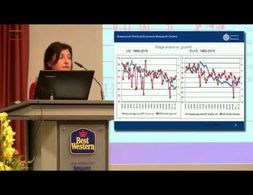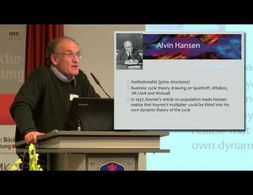1540 Ergebnisse
In this episode of the Planet Money podcast the Caribbean island of Barbuda is used as an example to explore the notion of property rights Until the island was struck by Hurricane Irma in November 2017 the island belonged to all Barbudans First there is a brief historic background given …
Understanding the financial crisis from four very different economic theories: Social Economics, Institutional Economics, Post Keynesian economics.
Surviving the Future is a story drawn from the fertile ground of the late David Fleming's extraordinary 'Lean Logic: A Dictionary for the Future and How to Survive It'. That hardback consists of four hundred and four interlinked dictionary entries, inviting readers to choose their own path through its radical vision. Recognizing that Lean Logic's sheer size and unusual structure can be daunting, Fleming's long-time collaborator Shaun Chamberlin has selected and edited one of these potential narratives to create Surviving the Future. The content, rare insights, and uniquely enjoyable writing style remain Fleming's, but are presented here at a more accessible paperback-length and in conventional read-it-front-to-back format
Lean Logic is the late David Fleming’s masterpiece, the product of more than thirty years’ work and a testament to the creative brilliance of one of Britain’s most important intellectuals. A dictionary unlike any other, it leads readers through Fleming’s stimulating exploration of fields as diverse as culture, history, science, art, logic, ethics, myth, economics, and anthropology, being made up of four hundred and four engaging essay-entries covering topics such as Boredom, Community, Debt, Growth, Harmless Lunatics, Land, Lean Thinking, Nanotechnology, Play, Religion, Spirit, Trust, and Utopia. The threads running through every entry are Fleming’s deft and original analysis of how our present market-based economy is destroying the very foundations—ecological, economic, and cultural— on which it depends, and his core focus: a compelling, grounded vision for a cohesive society that might weather the consequences
Özlem Onaran analyses the current problems of secular stagnation from a global perspective. At the core of global economic problems is insufficient demand caused by falling wage shares, because most individual countries, and the world as a whole are “wage-led”. Hence a strategy for global growth is to aim at increasing wages and thus the wage share, and the abandonment of policies focusing purely on national competitiveness. Financialization has broken the link between corporate profitability and investment. Reregulation of finance and higher public investment is required in order to crowd in private investment, in this way, reversing the declining trend of potential output growth.
Aim of this intensive workshop is 1.) to introduce the participants to the macroeconomic workings of the climate crisis as the background of sustainable finance; 2.) to introduce financial assets with ESG (Environmental, Social and Governance) criteria attached to them and their markets and important institutional players; 3.) to provide a critical perspective on the current setup of sustainable finance; 4.) and to work on in-depth case studies illustrating the workings on ESG-finance markets, its emitters and traders as well as their macroeconomic implications.
The last 15 years have seen extensive research into ecosystem service valuation (ESV), spurred by the Millenium Ecosystem Assessment in 2005 (Baveye, Baveye & Gowdy, 2016). Ecosystem services are defined as “the benefits people obtain from ecosystems” (Millenium Ecosystem Assessment, p.V). For example, ecosystems provide the service of sequestering carbon which helps regulate the climate. Valuation means giving ecosystems or their services a monetary price, for example researchers have estimated that the carbon sequestration services of the Mediterranean Sea is between 100 and 1500 million euros per year. The idea of ESV was a response to the overuse of natural resources and degradation of ecosystems, allegedly due to their undervaluation and exclusion from the monetary economy. ESV can be used (1) for policy decision-making, for example allocating funding to a reforestation project (2) for setting payments to people who increase ecosystem services, for example a farmer increasing the organic carbon content of their soil, and (3) for determining fees for people who degrade ecosystem services, for example a company that causes deforestation.
As opposed to the conventional over-simplified assumption of self-interested individuals, strong evidence points towards the presence of heterogeneous other-regarding preferences in agents. Incorporating social preferences – specifically, trust and reciprocity - and recognizing the non-constancy of these preferences across individuals can help models better represent the reality.
After a brief illustration of sovereign green bonds’ features, this paper describes the market evolution and identifies the main benefits and costs for sovereign issuers. The financial performance of these securities is then analysed.
In this keynote speech, Roger Backhouse gives a historical overview of theories on secular stagnation: how it evolved from a description of the economic situation, especially in the U.S. of the 1930s to an analytical tool and then lost importance until its current revival. Backhouse touches upon the contributions of J. A. Hobson, Alvin Hansen, Evsey Domar and Paul Samuelson.
These notes aim to clarify some basic features and implications of gross capital flows In the context of the 2007 08 Global Financial Crisis and the 2010 12 Eurozone Crisis trade imbalances and capital flows received a lot of attention from academics policymakers and the media However there is still …
This article applies insights from behavioral economics to consider how the general public may make decisions around whether or not to receive a future COVID-19 vaccine in a context of frequent side effects and preexisting mistrust. Three common cognitive biases shown to influence human decision-making under a behavioral economics framework are considered confirmation bias, negativity bias, and optimism bias.
The need for the movement Black Lives Matter and the tragic events that preceded it are the clear manifestation of the problem of discrimination today, which we all intuitively perceive as a poignant socio-economic question of our times.
From the two premises that (1) economies are complex systems and (2) the accumulation of knowledge about reality is desirable, I derive the conclusion that pluralism with regard to economic research programs is a more viable position to hold than monism. To substantiate this claim an epistemological framework of how scholars study their objects of inquiry and relate their models to reality is discussed. Furthermore, it is argued that given the current institutions of our scientific system, economics self-organizes towards a state of scientific unity. Since such a state is epistemologically inferior to a state of plurality, critical intervention is desirable.
This edited volume presents a collection of articles that engage with various concepts from Marx’s Capital and Marxian theory in general, from a ‘Southern’ perspective. The book engages with four specific themes: “Reception of Capital in the East; Value, Commodity, Surplus Value and Capitalism; Population and Rent in Capital; and Issues Beyond Capital”.
It is perhaps fitting that the seriousness of the coronavirus threat hit most of the Western world around the Ides of March, the traditional day of reckoning of outstanding debts in Ancient Rome. After all, problems and imbalances have accumulated in the Western capitalist system over four decades, ostensibly since it took the neoliberal road out of the 1970s crisis and kept going along it, heedless of the crises and problems it led to.
In China's Gilded Age, Yuen Yuen Ang maintains that all corruption is harmful, but not all types of corruption hurt growth. Ang unbundles corruption into four varieties: petty theft, grand theft, speed money, and access money.
Caring activities are one central element of feminist economists' analysis – also since in particular unremunerated work is a blind spot in mainstream economics and most other economic paradigms. Those focus on the market sphere: activities are considered as productive and as real labour if they are remunerated and market-intermediated. Goods and services are considered as labour if they create a value which can be traded on the market. Feminist Economics remarks that this perspective creates certain dichotomies and consequent devaluations: unproductive – productive; private – public; unpaid – remunerated OR paid less – well paid; female – male; soft work – hard work; caring – rationality.
Commons stand for a plurality of practices ‘beyond market and state’ as the famous Commons scholar – and first female noble prize winner of economics - Elinor Ostrom put it. Their practice and theory challenge classical economic theory and stand for a different mode of caring, producing and governing. Within this workshop we want to dive into theory, practice and utopia of Commons following four blocks...
Introduces four of the most influential economists you'll never read in a modern economics class - Marx, Veblen, Keynes, and Galbraith.
"The New Classical Macroeconomics "gives an accessible, rigorous, critical account of the central doctrines of the new classical economics, without unnecessarily difficult mathematics. It focuses on four central issues: the foundation of monetary theory; monetary and fiscal policy; labour supply and business cycles; and the attack on econometric models.
Paul Collier describes the four important topics that he thinks would help the "bottom billion" in the long-run: aid, trade, security and governments. In this short video, Collier explains why he considers government support important.
The most successful multialternative theories of decision making assume that people consider individual aspects of a choice and proceed via a process of elimination. Amos Tversky was one of the pioneers of this field, but modern decision theorists – most notably Neil Stewart – have moved things forward. At the current stage the theories are able to explain a number of strictly ‘irrational’ but reasonable quirks of human decision making, including various heuristics and biases. Not only this, but eye movements of participants strongly imply that the decision-making process depicted in the theories is an accurate one.
Markets are the focus in modern economics: when they work, when they don’t and what we can or can’t do about it. There are many ways to study markets and how we do so will inevitably affect our conclusions about them, including policy recommendations which can influence governments and other major organisations. Pluralism can be a vital corrective to enacting real policies based on only one perspective and a plethora of approaches provide alternatives to the canonical view. Although they have differing implications, these approaches share the idea that we should take a historical approach, analysing markets on a case-by-case basis; and they share a faith in the power of both individuals and collectives to overcome the problems encountered when organising economic activity.
The Philosophy of Economics Foundational Text provides a systematic and well-structured overview over the field of philosophy of economics.
In the history of the social sciences, few individuals have exerted as much influence as has Jeremy Bentham. His attempt to become “the Newton of morals” has left a marked impression upon the methodology and form of analysis that social sciences like economics and political science have chosen as modus operandi.
By conducting a discourse analysis (SKAD) in the field of academic economics textbooks, this paper aims at reconstructing frames and identity options offered to undergraduate students relating to the questions ‘Why study economics?’ and ‘Who do I become by studying economics?’. The analysis showed three major frames and respective identity offerings, all of which are contextualized theoretically, with prominent reference to the Foucauldian reflection of the science of Political Economy. Surprisingly, none of them encourages the student to think critically, as could have been expected in a pedagogical context. Taken together, economics textbooks appear as a “total structure of actions brought to bear upon possible action” (Foucault), therefore, as a genuine example of Foucauldian power structures.
This paper starts with an evaluation of three common arguments against pluralism in economics: (1) the claim that economics is already pluralist, (2) the argument that if there was the need for greater plurality, it would emerge on its own, and (3) the assertion that pluralism means ‘anything goes’ and is thus unscientific. Pluralist responses to all three arguments are summarized. The third argument is identified to relate to a greater challenge for pluralism: an epistemological trade-off between diversity and consensus that suggests moving from a discussion about ‘pros’ and ‘cons’ towards a discussion about the adequate degree of plurality. We instantiate the trade-off by showing how it originates from two main challenges: the need to derive adequate quality criteria for a pluralist economics, and the necessity to propose strategies that ensure the communication across different research programs. The paper concludes with some strategies to meet these challenges.
The book provides an excellent comparative perspective on New Keynesian "New Consensus" economics and Post-Keynesian Economics at a beginner level. It also offers an interactive tool to understand how the economic models work, especially from a heterodox / pluralist perspective.
This Micro-Masters program on Circular Economy looks at the concept and its application from different angles, covering a very wide variety of topics (From Fossil Fuels to Biomass: A Chemistry Perspective; Circular Economy: An Interdisciplinary Approach; Economics and Policies in a Biobased Economy).
It offers a well-rounded, multidisciplinary perspective, using sciences and humanities together for a deeper understanding of the topic. A great start for newbies with Circular Economy!
The access to the course is for free, but you can also apply for full-time on-campus graduate-level programs, be it Wageninged or other universities.
The global financial crisis (GFC) led to increasing distrust in economic research and the economics profession, in the process of which the current state of economics and economic education in particular were heavily criticized. Against this background we conducted a study with undergraduate students of economics in order to capture their view of economic education.
Finance at the Threshold offers a unique perspective from an English economic and monetary historian. In it the author asks: Why did the banks stop lending to one another, and why now? Was it merely a matter of over-loose credit due to the relaxation of traditional prudence, or did global finance find itself at its limits?
Wir nutzen Cookies. Klicke auf "Akzeptieren" um uns dabei zu helfen, Exploring Economics immer besser zu machen!





























